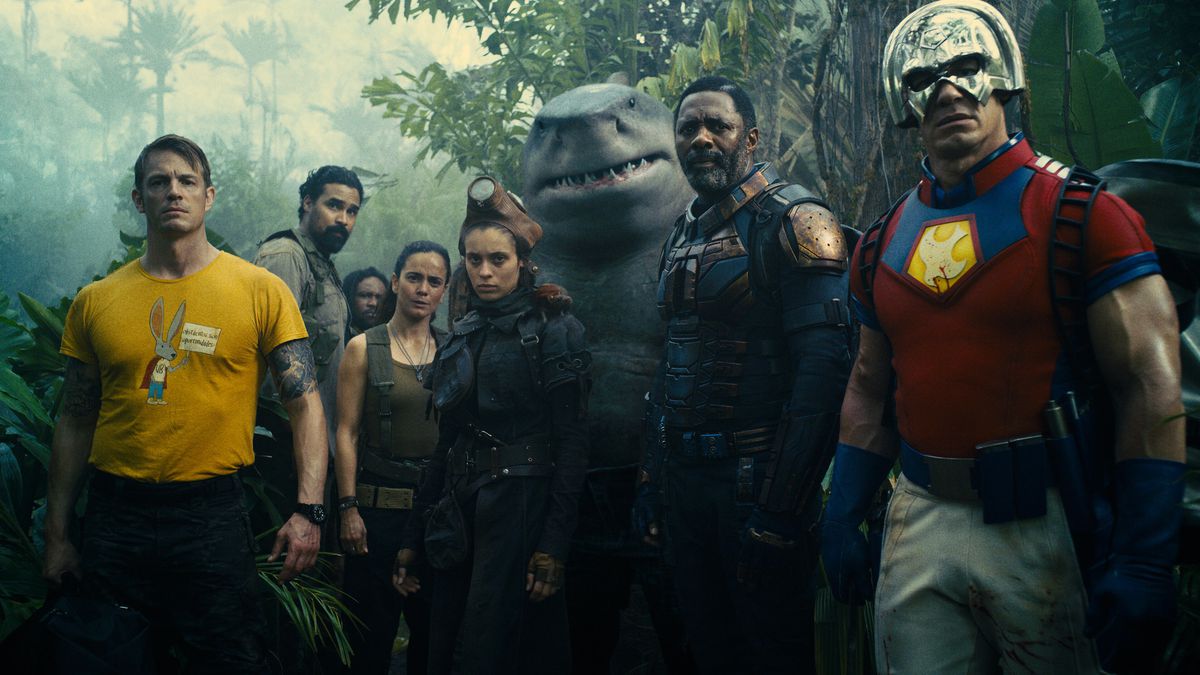Following in the proud tradition of The Predator and The Final Destination, The Suicide Squad is a sequel-slash-reboot of an underperforming franchise with nothing but a “the” to distinguish its title from the original. Unlike The Predator and The Final Destination, it sends its franchise in a good direction. Pivoting away from the jumbled dudebro grunginess of Suicide Squad, Warner Bros stole Guardians of the Galaxy director James Gunn after Disney (temporarily) fired him, working with him to reskin the Suicide Squad brand into something sillier. The tonal change pays off, but even more successful is their strategy for retroactively dealing with the first Suicide Squad: they made it an episode.
A bad movie is a roadblock, but a bad episode is a speedbump. With the latter, you just have to wait until next week (or, in the streaming era, through five seconds of credits) for the show to give it another try. The Suicide Squad does its best to replicate that feeling. It gets the bullet points of its concept out of the way immediately: these criminals are fighting crime at the behest of the U.S. government because agent Amanda Waller (Viola Davis, terrifying) will remotely explode their heads if they don’t. Here’s the new mission; here’s the current lineup; ok let’s go. In an era of connected plots across never-ending universes, it’s startling to see The Suicide Squad care so little about its place in the world. It doesn’t feel like a building block in a franchise—it feels like a Saturday morning special. Who cares how last week’s went?
READ ALSO: Review: ‘Birds of Prey’ reigns loud and proud
This is the one where the squad goes to South America to fight a giant alien starfish. The new members of the team are wonderfully distinctive: from costume design to performance quirks, these characters are so specific that you could picture how they’d pose in a fun opening credits sequence. The casting is dead-on all around. Idris Elba’s magnetic screen presence makes him a great ensemble lead, and his chemistry with John Cena’s jingoistic Peacemaker is one of the movie’s strongest comedic pillars. It’s the hulking, slimy, anthropomorphic King Shark who’s sure to be the favorite, though. Gunn wrings a surprising amount of pathos out of the literal shark-man. DC’s animated Harley Quinn series reinvented the character as a lovable goof, which made any pain he suffered a punch to the gut; The Suicide Squad makes him friendless, naïve, and misunderstood, which accomplishes the exact same thing. And he’s voiced by Sylvester Stallone. What more do you want?
A bit of dramatic structure would be nice, actually. The Suicide Squad’s lightweight vibe is welcome, but the movie has no forward momentum beyond “I wonder what crazy stuff happens in the next scene”. It’s undignified and unpredictable in a way that’s gleefully bizarre, but not so much riveting. The story isn’t shaped to beg the question of where it’s going. Until the third act, it’s practically a lineup of hyperviolent comedy sketches. But the ideas are inventive and the execution hilarious, so it’s a blast of a guilty pleasure—even if the dialogue tends toward that constant, glib, deadpan jokiness that’s threatening to homogenize all Hollywood humor. Gunn and his team pump the movie so full of color and lively camera choices that there’s usually something else to appreciate when the jokes aren’t landing.
What does land is gore, and a lot of it, with several loud splats. Studios have been generally more relaxed about R-rated superhero fare since the success of Deadpool, but the things that Warner Bros lets Gunn get away with are baffling. The Suicide Squad is cartoonishly gruesome. It recalls Gunn’s early work with Troma Entertainment, a studio that specializes in grossout comedy so provocative that YouTube took down their movies after Troma uploaded them for free. The Suicide Squad isn’t just Troma-esque in the severity of its violence, but in the scrappiness of its special effects as well—one of the movie’s funniest bits thrives on how low-budget it is compared to the CGI polish around it. Warner Bros let Gunn turn their property into a gonzo exploitation film. Perhaps even more atypical for the superhero genre these days, the movie is also a crude but clear indictment of U.S. imperialism—the Marvel industrial complex would never.
Every once in a while, the insanity dovetails into a sentimental ode to the weirdos, grabbing at the emotional weight that’s often vacuumed out of franchise work. It’s earnest, but inelegant, trying a little too hard to prove itself. It’s indicative of a certain insecurity on Gunn’s part: he’s still haranguing Scorsese for saying that superhero movies are more like theme park rides than art, ostensibly from a place of wanting his work taken seriously. Maybe, when Gunn realizes that his work is great precisely because he’s functioning in a theme park register, he’ll make his best blockbuster yet.
★★★★ (4/5)




